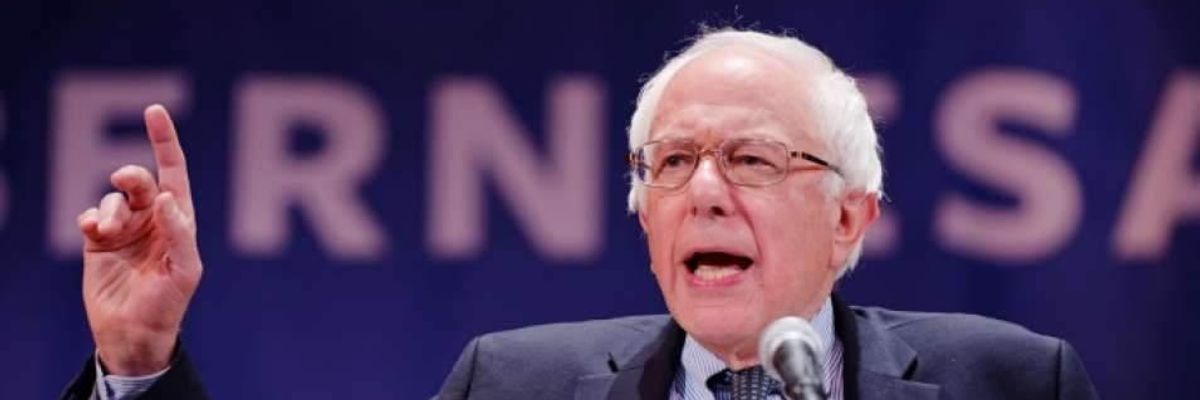To combat astronomical wealth inequality across the United States, Sen. Bernie Sanders (I-Vt.) on Thursday introduced the For the 99.8% Act (pdf), which would impose a progressive estate tax on the ultra wealthy and significantly raise rates on the nation's billionaires.
"The fairest way to reduce wealth inequality, invest in the disappearing middle class, and preserve our democracy is to enact a progressive estate tax on the inherited wealth of multi-millionaires and billionaires."
--Sen. Bernie Sanders
"Our bill does what the American people want by substantially increasing the estate tax on the wealthiest families in this country and dramatically reducing wealth inequality," Sanders said in a statement that specifically pointed to the Koch, Walton, and Bezos families.
The Independent senator's proposal comes just days after Senate Republicans showed that "greed has no limit for the GOP" by putting forward a bill to permanently repeal the estate tax, a move that critics blasted as yet another "blatant giveaway to their wealthy donors."
"At a time of massive wealth and income inequality, when the three richest Americans own more wealth than 160 million Americans, it is literally beyond belief that the Republican leadership wants to provide hundreds of billions of dollars in tax breaks to the top 0.2 percent," Sanders declared Thursday.
Like the bill currently being pushed by the Senate's Republican leaders, Sanders' measure would also target the wealthiest 0.2 percent of Americans--but unlike the GOP legislation, it aims to make the rich pay more in taxes, and close loopholes that have enabled them to easily pass on massive wealth to younger relatives.
Specifically, Sanders' plan would establish:
- a 45 percent tax on the value of an estate between $3.5 million and $10 million;
- a 50 percent tax on the value of an estate between $10 million and $50 million;
- a 55 percent tax on the value of an estate in excess of $50 million;
- and a 77 percent tax on the value of an estate above $1 billion--a return to the top rate from 1941 through 1976.
While the timetable would be uncertain, as estate taxes only take effect when someone dies, Sanders' team estimates the changes would raise $2.2 trillion from the country's 588 billionaires. Policy aides told the Washington Post that over the next decade, the tax would raise about $315 billion.
Citing estimates by Sanders' staff based on Forbes data, the Post outlined:
The law would dramatically affect how much taxes the wealthiest Americans pay when they die. Under current law, Jeffrey P. Bezos' heirs would pay $52 billion in estate tax upon his death, while Bill Gates' heirs would pay $38 billion... The GOP proposal would take both of their payments down to $0, while Sanders' would raise them to $101 billion and $74 billion, respectively.
Sanders' bold bill also comes on the heels of a proposed wealth tax from Sen. Elizabeth Warren (D-Mass.), who is considering running for president in 2020. After billionaire and former Starbucks CEO Howard Schultz--who's also weighing a presidential run--dismissed her plan as "ridiculous," Warren charged, "What's 'ridiculous' is billionaires who think they can buy the presidency to keep the system rigged for themselves while opportunity slips away for everyone else."
Sanders' policy director Warren Gunnels mused on Twitter that Schultz--who's worth more than $3 billion, according toForbes--"is probably not going to like our bill, but that's ok. It's called For the 99.8 percent Act for a reason."
Welcoming the measure, Chuck Collins of the Institute for Policy Studies wrote for Common Dreams on Thursday, "Sanders' estate tax proposal is a plutocracy prevention act, squarely aimed at preventing the children of today's billionaires from dominating our future democracy, economy, culture, and philanthropy."
Massive fortunes that exceed $100 million, explained Collins, are "a form of power" that the nation's ultra wealthy use "to rig the rules of our economy and shape the culture through ownership of media." Sanders' proposal, he said, "is one of the ways we protect our society" from what President Theodore Roosevelt called the "tyranny of plutocracy."
"Today's U.S. is becoming even more unequal than Pre-World War I Europe... The way out is stronger investment in skills, higher paying jobs, and a more progressive tax system."
--Thomas Piketty, economist
Endorsing Sanders' plan, Paris School of Economics professor Thomas Piketty noted that "one century ago, the U.S. invented steeply progressive estate and income taxes in order to maintain the egalitarian and democratic legacy of the country. Today's U.S. is becoming even more unequal than Pre-World War I Europe."
"The way out is stronger investment in skills, higher paying jobs, and a more progressive tax system," Piketty argued, calling Sanders' estate tax legislation "an important step in this direction."
In a series of tweets about his new proposal, Sanders asserted that "the fairest way to reduce wealth inequality, invest in the disappearing middle class, and preserve our democracy is to enact a progressive estate tax on the inherited wealth of multi-millionaires and billionaires."
"From a moral, economic, and political perspective," he concluded, "our nation will not thrive when so few have so much and so many have so little."
Sanders took to the Senate floor on Thursday to decry rampant wealth inequality and discuss his proposal to address it:

